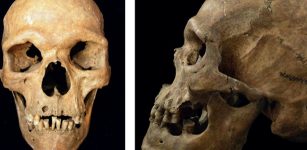New Genes May Explain Why Humans Got Such Big Brains
Conny Waters - AncientPages.com - Scientists have identified three new genes that may explain why humans got such big brains.
The evolution of larger brains in the last 3 million years played an important role in our ability as a species to think, problem-solve, and develop culture. But the genetic changes behind the expansion that made us human have been elusive.
It now seems a gene family, NOTCH2NL, plays an important role in human-specific cortex development and may have been a driving force in the evolution of our large brains.
This image shows a human skull overlaid with an illustration of the human brain.
Credit: Fiddes et al./Cell
According to a study led by researchers at the University of California Santa Cruz these three nearly identical genes have only been found in humans.
The genes appeared between 3 and 4 million years ago, just before the period when fossils show a dramatic increase in the brain sizes of human ancestors. In modern humans, genes are involved in genetic defects associated with neurological disorders.
"Our brains got three times as big primarily through the expansion of certain functional areas of the cerebral cortex, and that has to be a fundamental substrate for us becoming human. There's really no more exciting scientific question that I can think of than discovering and decoding the mysterious genetic changes that made us who we are," says David Haussler, co-senior author of one of the papers and a bioinformatician at the University of California, Santa Cruz, and Howard Hughes Medical Institute.
Reconstructing the evolutionary history of NOTCH2NL genes revealed that a process called gene conversion was likely responsible for repairing a non-functional version of NOTCH2NL, which originally emerged as a partial duplication of an essential neurodevelopmental gene known as NOTCH2. This repair happened only in humans -- and they estimate it happened 3-4 million years ago, around the same time that the fossil record suggests human brains began to expand. After it was repaired, but before we diverged from our common ancestor with Neanderthals, NOTCH2NL was duplicated two more times.
"One of the holy grails of researchers like us is to find out what during human development and evolution is responsible for a bigger brain, particularly the cerebral cortex," Pierre Vanderhaeghen of Université Libre de Bruxelles ULB and VIB-KU Leuven says.
"Given the relatively fast evolution of the human brain, it is tempting to speculate that newly evolved, human-specific genes may help shape our brain in a species-specific way."
Written by Conny Waters – AncientPages.com Staff
Expand for references




















